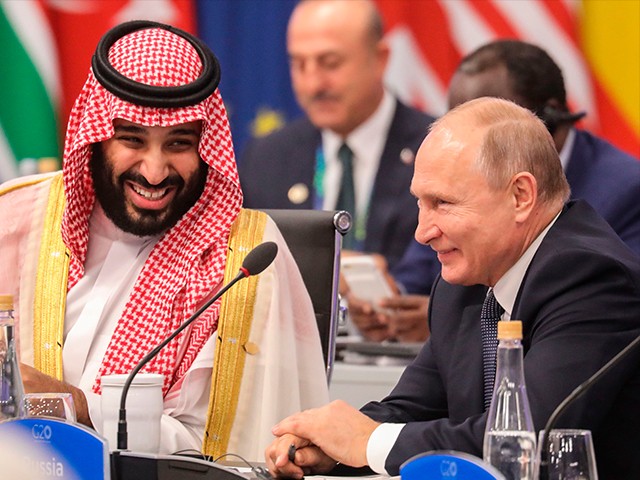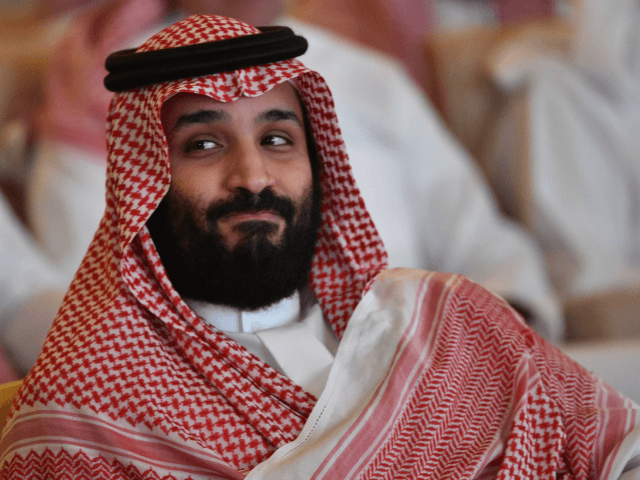Saudi Crown Prince Mohammed bin Salman expressed his “commitment to supporting the Palestinian people’s legitimate rights” in separate conversations with Arab leaders on Tuesday, including Palestinian Authority leader Mahmoud Abbas – abstaining from directly condemning the Palestinian terrorist group Hamas for gruesome wave mass killings against Israeli civilians.
Hamas launched an unprecedented attack inside Israel on Saturday, targeting civilians in door-to-door attacks in which they tortured, raped, killed, and desecrated the corpses of their victims. Reports on Tuesday indicate that Israeli authorities have found the bodies of infants murdered by jihadist killers, 40 reportedly in one kibbutz alone.
i24NEWS Correspondent @Nicole_Zedek reports from Kibbutz Kfar Aza, a quarter-mile from the Gaza border, and recounts the atrocities that were committed in the small community which remains an active scene as soldiers clear booby traps and recover the bodies of dozens of victims pic.twitter.com/J4ZfWZQYHp
— i24NEWS English (@i24NEWS_EN) October 10, 2023
As of Tuesday, Israeli authorities have confirmed that Hamas terrorists have killed over 1,000 people in the past four days. As Israel is slowly regaining access to affected communities, the death toll, particularly of civilians killed in their homes, continues to consistently increase. Hamas is also believed to be holding over 100 people hostage following the assault.
The Palestinian terror attack happened on the Jewish holiday of Shemini Atzeret, the final day of the annual High Holy Day cycle.
RELATED: Video Shows Hamas Rockets, Paragliders, Terrorists Streaming into Israel
Izz ad-Din al-Qassam Brigades via StoryfulOn Saturday, following the initial onslaught by Hamas, the Saudi Ministry of Foreign Affairs issued a statement failing to condemn Hamas or express any sympathy to Israel for the slaughter of its civlians. The statement blamed the “Israeli occupation forces” for escalating the situation and demanded the creation of a Palestinian state.
“The Kingdom calls for an immediate halt to the escalation between the two sides, the protection of civilians, and restraint,” the statement read in part. “The Kingdom recalls its repeated warnings of the dangers of the explosion of the situation as a result of the continued occupation … renews the call of the international community to assume its responsibilities and activate a credible peace process that leads to the two-state solution.”
#Statement | The Kingdom of Saudi Arabia is closely following the developments of the unprecedented situation between a number of Palestinian factions and the Israeli occupation forces, which has resulted in a high level of violence on several fronts there. pic.twitter.com/KEFsNB5ZVb
— Foreign Ministry 🇸 (@KSAmofaEN) October 7, 2023
On Tuesday, the Saudi government and its Saudi Press Agency (SPA) shared details of calls that the crown prince made to several Arab leaders in the region, also devoid of statements condemning Hamas.
In talks with Abbas, the Palestinian Authority leader, Mohammed bin Salman reportedly “expressed deep concern over the worsening conditions in Gaza” – presumably a response to Israel announcing a military operation to respond to Hamas’s terrorism – and “reiterated the Kingdom’s unwavering commitment to supporting the Palestinian people in their pursuit of legitimate rights,” according to the Saudi news organization al-Arabiya.
🇸 📞 🇵🇸 | HRH Crown Prince Mohammed bin Salman received a phone call from the Palestinian President Mahmoud Abbas. pic.twitter.com/Pt5wlw6Vk0
— Foreign Ministry 🇸 (@KSAmofaEN) October 10, 2023
In a separate conversation with Egyptian strongman Abdel Fattah al-Sisi, the crown prince similarly expressed “commitment to supporting the Palestinian people’s legitimate rights, hopes, and aspirations.”
Sisi independently called for a “ceasefire” in the region on Tuesday.
“We are communicating with all international and regional parties in order to reach an immediate cessation of violence and achieve de-escalation,” the Egyptian leader said in a statement.
The statements out of Saudi Arabia differ significantly from the pronouncements of its neighbors and allies, the United Arab Emirates (UAE) and Bahrain. Both Gulf nations signed agreements in 2020 known as the Abraham Accords, which led to the establishment of peaceful ties and increased economic activity between their capitals and Israel.
Abu Dhabi issued the most forceful statement against the Hamas terrorists. Its Foreign Ministry “stressed that attacks by Hamas against Israeli towns and villages near the Gaza strip, including the firing of thousands of rockets at population centers, are a serious and grave escalation.” The UAE also encouraged the world not to follow Hamas into “nihilistic destruction.”
“The Ministry is appalled by reports that Israeli civilians have been abducted as hostages from their homes,” the Emirati government asserted. “Civilians on both sides must always have full protection under international humanitarian law and must never be a target of conflict.”

File/Russia’s President Vladimir Putin (R) and Saudi Arabia’s Crown Prince Mohammed bin Salman attend the G20 Leaders’ Summit in Buenos Aires, on November 30, 2018. ( LUDOVIC MARIN/AFP/Getty Images)
This Torah arrived in Saudi Arabia 🇸 a few days ago, inscribed in the merit of King Salman and Crown Prince #MBS. Looking forward to seeing it myself very soon. @RabbiHerzog pic.twitter.com/AjUtanDAIl
— Avi Kaner ابراهيم אבי (@AviKaner) May 9, 2022
Reports in early October indicated that Riyadh and Jerusalem were attempting to develop a peace agreement, but the administration of leftist President Joe Biden had obstructed the talks with unsolicited demands for Israel to offer concessions to Palestinian leaders.

COMMENTS
Please let us know if you're having issues with commenting.